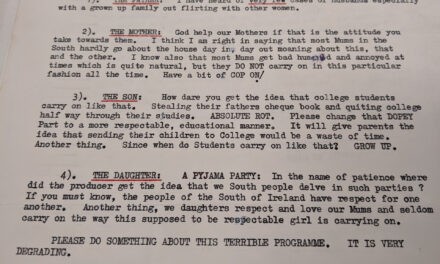In July 2014 the BBC announced that it would be ending its exclusive promo production deal with Red Bee Media when the contract runs out in December 2015. Since 2005 Red Bee Media have been producing the majority of the BBC’s promotion and marketing content, from idents for its television channels to trailers for its programmes and apps and other forms of interactive promotional content. The rest of its promotional work is produced by a roster of ad agencies comprised of Karmarama and Rainey Kelly Campbell Roafe/Y&R.
With marketing often seen as an irritant you may wonder why it matters who makes the BBC’s promotional content. But this announcement reveals not only the importance of marketing to television, but also (much like Tony Hall’s proposals to separate BBC production and broadcasting discussed by John Ellis) the complex role of markets for contemporary public service broadcasters.
To understand the significance of the announcement we need to go back to the restructuring of the BBC in the 1990s. Born out of pressure from a Conservative government seeking the marketisation of public service broadcasting, the BBC underwent a period of organisational change in which both internal and external competition were encouraged. When the BBC’s Charter renewal in 1996 endorsed the provision of commercially funded services by the BBC, John Birt (BBC Director General, 1993-2000) announced a radical restructuring of the organisation. This led to the development of a number of wholly owned commercial subsidiaries within the corporation that sold expertise developed in-house to external clients for the first time. Although many of the organisational changes that Birt introduced to programme production within the BBC over the 1990s were reversed in the early 2000s, the commercialisation of the corporation’s service and resource departments continued. In December 2000 the BBC’s design units in London, Bristol, Birmingham and Belfast were brought together into a new commercial subsidiary named BBC MediaArc, in a move based on the belief that there was an external market for the BBC’s in-house skills in broadcast design. BBC MediaArc sold expertise in graphic design, animation and branding not just to emerging broadcast clients, such as digital broadcaster OnDigital, but also to non-media clients, including HSBC, Royal Britannia and Wessex Water. Much of this work involved partnering with ad agencies, although BBC MediaArc worked directly with Wessex Water as a supplier of integrated advertising, creating four television spots, print advertising, outdoor branding and doing all of the media buying. Here BBC MediaArc undertook roles normally taken by an integrated advertising agency.
In 2002, BBC MediaArc was incorporated into a new commercial subsidiary named BBC Broadcast Ltd that combined the graphic design, animation and branding expertise of BBC MediaArc with the BBC’s ‘creative services’ division (responsible for trailers, promotional campaigns and idents for the corporation), and the corporation’s broadcast services of playout and subtitling. This consolidation was designed to enhance the corporation’s commercial offer in the areas of promotion and advertising, while also opening up new markets in television playout. BBC Broadcast continued to work for both broadcast and non-broadcast clients in creating advertising and promotional content.
In June 2005, BBC Broadcast was sold for £166 million to the Australian investment fund bank Macquarie Capital Alliance Group (MCAG) and was renamed Red Bee Media three months later. According to Broadcast the deal was underpinned by £500 million of BBC contracts, including the contract to produce the majority of the BBC’s promotional content until the end of 2015.
When BBC Broadcast was sold to MCAG, 91 percent of its turnover came from BBC-driven business. And today, the majority of the work of the creative division of Red Bee comes from its contract with the BBC. And so, with the BBC deciding to take the majority of its promotional work back in-house, it seems that we have come full circle. Perhaps the case of Red Bee can be seen as indicative of the failure of the neo-liberal attempt to marketise broadcasting. But there is something quite specific about the case of marketing which makes the sale of BBC Broadcast different from the current debates about BBC Production, and this stems from the nature of the market for broadcast promotion and marketing.
Ad agencies have complained that the BBC’s contract with Red Bee Media was unfair, preventing the BBC from accessing the best directing and production talent and closing the market to other players. Yet the market for creative marketing work within the television industry is far from open anyway. The fact is that the majority of broadcasters create most of their marketing and promotional work in-house. There are a number of reasons for this. The work is high turnover given the number of programmes typically broadcast every day by most channels. This makes it far more practical to produce in-house and not really suitable to an external pitch/commission process. Out-sourcing promotional work can also lead to some duplication of labour. For example, Red Bee (as with most advertising agencies) employs strategic planners who act as the voice of the audience in the development of creative work, often undertaking research or interpreting audience and market data. Within in-house marketing departments this role is less common with audience and market insight coming from the broadcaster’s own audience research and media planning departments.
Over and above this, however, is the role of promotion for broadcasters. As I have argued elsewhere, promotional content is one of the central ways in which broadcasters and channels communicate their identities and values to their viewers. Idents, promos and trailers contribute to the tone of voice and identity of television channels and are a key tool in helping them to stand out within a competitive marketplace. As Andy Bryant (Director of Creative at Red Bee Media) said to me in an interview, ‘most broadcasters choose to do what we do in-house because they fell it’s core to their creative soul’. It is then, perhaps no surprise that the BBC has not chosen to open its promotional work up to a larger number of suppliers or to give the Red Bee contract to a different agency. Rather it has taken its ‘core creative and operations services’ – its day-to-day promotional work – in-house, with other services (presumably larger one-off or event campaigns and re-brands) being opened to external pitching.
While advertising agencies may have complained that the Red Bee contract restricted their access to BBC’s promotional work, the fact of the matter is that the UK market for broadcast promotional work is small simply because the majority of this work is created in-house. And it is also quite specialised. The demands of cutting high turnaround clip-based trailers are quite different from the creative expertise of the typical advertising campaign produced with high budgets and long production schedules. The creative skill of producing an ident is particularly specialised and distinct from producing a logo or brand for a consumer product/service. As Charlie Mawer (Executive Creative Director of Red Bee Media) has said of the work of creating an ident:
Trying to do something you can watch 3,600 times without getting irritated by it is a particular challenge and it necessitates a particular type of storytelling and a particular type of engagement that is less about grabbing you by the jumper and shaking you and is much more about giving you something you can sit back and be immersed in, that you can take stuff from. It’s a different level of engagement. (cited in Grainge 2011: 94)
So Red Bee’s loss of the BBC contract is, perhaps, an indication of the failure of marketisation, in that the market for broadcast promotional work will remain small as long as broadcasters believe that marketing and promotion remains a core part of the work of broadcasting.
It is too early to say what impact the loss of the BBC contract in December 2015 will have on the creative division of Red Bee, particularly as Red Bee has recently been bought by Ericsson. Red Bee’s creative division remains an important player within the broadcast marketing market with clients in the UK (such as UKTV) and overseas and a strong reputation for the quality of its creative work (winning 15 awards at the European PromaxBDA in 2014). It is also seeking to extend its production of creative content for non-media brands. Yet this move, while one that has its basis in the creation of BBC MediaArc back in 2000, is not an easy one to make. With many clients having long-standing relationships with advertising agencies for their creative work it can be hard for a broadcast specialist to convince that it has the necessary skills and expertise to produce creative work outside of the broadcast market.
Having worked closely with Red Bee over the past few years, I’m also acutely aware of the human implications of these deals – something that is often overlooked it academic debates about the marketisation of broadcasting. It is hard to imagine that the loss of their major client will not lead to job losses within the creative division of Red Bee – although presumably the BBC will shortly be recruiting creatives for its in-house marketing department.
It will also be interesting to see what impact this move has on the BBC’s creative marketing and promotion after December 2015. With the corporation struggling with reduced funding it may well be that bringing its core promotional work back in-house is an attempt to cut its marketing budgets. With programme production budgets under threat it will be difficult to argue that the licence fee should be spent on marketing. So although the return of the BBC’s promotional work in-house may be a reflection of the importance of marketing communications to broadcasters, it may equally be an attempt to cut costs in this area. I do hope that the BBC properly values the work of its in-house marketing creatives. The work that they do not is not only central in today’s non-linear world in helping viewers to find content, but also plays a profound role in communicating the corporation’s public service values – something that is becoming more important in the face of increasing commercialisation. To borrow the words of one BBC executive in 1999, marketing plays a central role in ‘completing that virtuous circle, linking consumption [of BBC programmes] with credit back to the BBC and ultimately with approval of the licence fee’.
Catherine Johnson is Associate Professor in Film and Television at the University of Nottingham. She is the author of Branding Television (Routledge, 2012) and Telefantasy (British Film Institute, 2005) and the co-editor of Transnational Television History (Routledge, 2012) and ITV Cultures: independent television over fifty years (Open University Press, 2005). Her new book The Promotional Screen Industries (co-authored with Paul Grainge) will be published by Routledge in Spring 2015.





